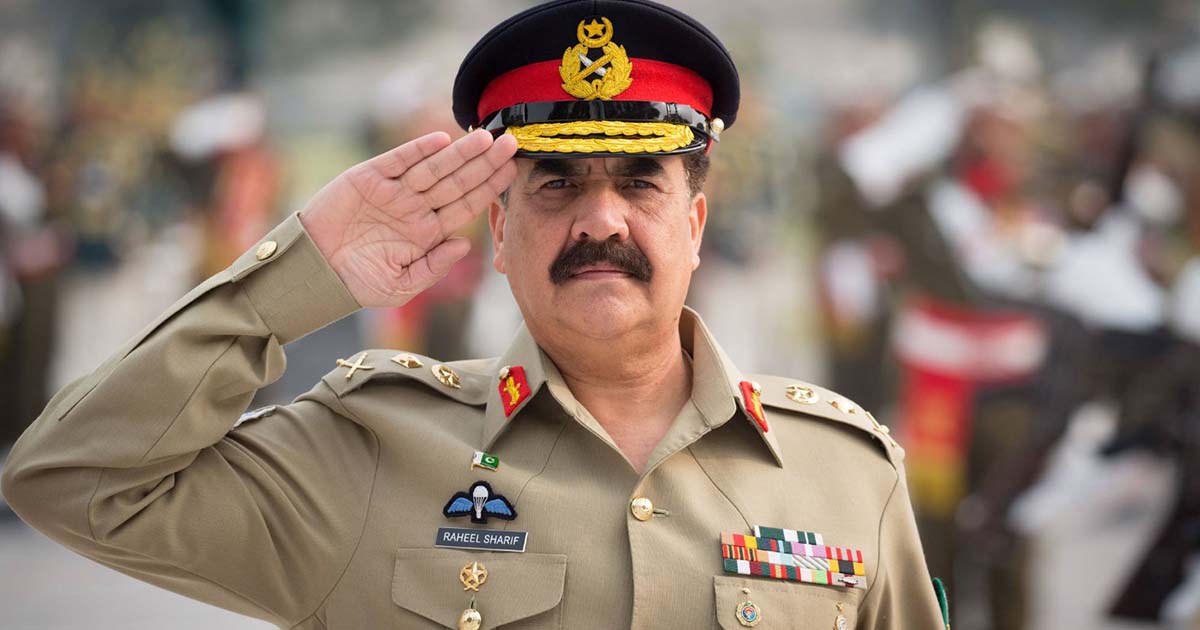Shuja Nawaz, an acclaimed author on Pakistan’s military and political affairs, made an astounding revelation on Gen Raheel Shareef’s staunch support for the democracy and constitution of Pakistan in his book titled, ‘The Battle for Pakistan: The Bitter US Friendship and a Tough Neighbourhood‘. Gen Raheel Shareef through his upright move thwarted a coup attempt by former DG ISI allegedly in 2014.
Nawaz quoted Richard Olson-former United States Ambassador to Pakistan as saying that former Army Chief, General Raheel Shareef, thwarted a coup attempt in 2014.
In the chapter of the book, Mil-to-Mil Relations: Do More, Shuja Nawaz wrote that DG ISI Zaheer-ul-Islam was planning a coup with corps commander and likeminded army officers in September 2014. Army Chief Raheel Sharif foiled the coup and removed Zaheer-ul-Islam from his post.
Azaz Syed’s review of my new book in https://t.co/ebKUMWImrq | Karachi https://t.co/heEGbzU4Qo
— Shuja Nawaz (@shujanawaz) December 30, 2019
An excerpt from the book quoted Richard Olson as saying that, “We received information that Zahir-ul-Islam, the DG ISI, was mobilizing for a coup in September of 2014. (Army Chief) Raheel (Sharif) blocked it by, in effect, removing Zahir, by announcing his successor…(Zahir) was talking to the corps commanders and was talking to like-minded army officers…He was prepared to do it and had the chief been willing, even tacitly, it would have happened. But the chief was not willing, so it didn’t happen.”
Gen Raheel Shareef is one of the most celebrated army chiefs particularly for his foremost support in strengthening democracy in Pakistan. Often, social media trends like ‘Thank You Raheel Shareef’ hailed his efforts for restoring peace in Karachi and thwarting extremism and terrorism in Pakistan.
Read more: Can Raheel Sharif help to improve tense relations between Saudis and Pakistanis?
Shuja Nawaz mentioned that Richard Olson made these comments on political turmoil following the 2013 elections.
America’s view of ISI chiefs
The book also offers interesting insights into the USA’s views regarding the succeeding ISI chiefs.
For Americans, former DG ISI Lt. Gen Ahmed Shuja Pasha, was “straight-shooting super nationalist general who had come into the world of intelligence on the insistence of Gen Kayani,” wrote Shuja Nawaz in his book.
If true then I shall say for the first time in my life w/out any mock-seriousness #ShukriyaRaheelSharif
P.S. On a different note when will such adventurism stop? 1 good litmus test whether u want it to stop is 2 see if you support Art 6 Musharraf verdicthttps://t.co/U5WjFf3vsi
— Osama Siddique (@DrOsamaSiddique) December 30, 2019
Decision of a wise man can save nations from the chaos.
We need this type of COAS who is morally strong enough and as a nation we should be thankful to a gentleman who lived up to his oath taken on the day of passing out. https://t.co/1vfz3K5OHS— sohail khan (@sohailkhan4200) December 30, 2019
Shuja Pasha was described as the aggressive head of the country’s top intelligence agency in the book. The author asserted that Pasha used to remit virtually at will and demanded greater access to information regarding the US operations and operatives inside Pakistan. Hence, he was at the top list of American surveillance. Even his travel abroad was tracked by US Intelligence agencies.
During Pasha’s time, 3 Pakistan-US joint intelligence fusion cells were shut down, perhaps that’s why he was disliked by the USA.
The author even discussed at length the extent of the penetration of US surveillance in Pakistani organizations. The US surveillance of ISI even continued after Pasha.
His successor, Lt. Gen Zaheer-ul-Islam, the DG ISI, directed his focus on the internal politics and turmoil of dharna’s, sit-in that resulted after elections in 2013.
An excerpt from the book read, “Both Pasha and Islam’s names were associated with the street opposition to Prime Minister Nawaz Sharif; though no solid evidence came to the surface. Islam was also a former head of one of the ISI’s wings or directorates, and then had been in the hurly-burly of Karachi politics as the corps commander there.”
Read more: Fascist India has crossed all Limits with Agendas of Muslim Genocide: Gen Raheel Sharif
Meanwhile, a US-trained, former DG ISI Rizwan Akhtar, who also served as the DG Rangers Sindh, maintained good relations with his US counterparts, became unpopular in ISI and army due to his hands-on approach.
“Akhtar failed to win the confidence of the new army chief Gen Bajwa and resigned by taking early retirement,” wrote Shuja Nawaz in his book.
The following DG ISI, Naveed Mukhtar, also a US-trained officer, who previously served as the Corps Commander Karachi, succeeded Rizwan Akhtar.














